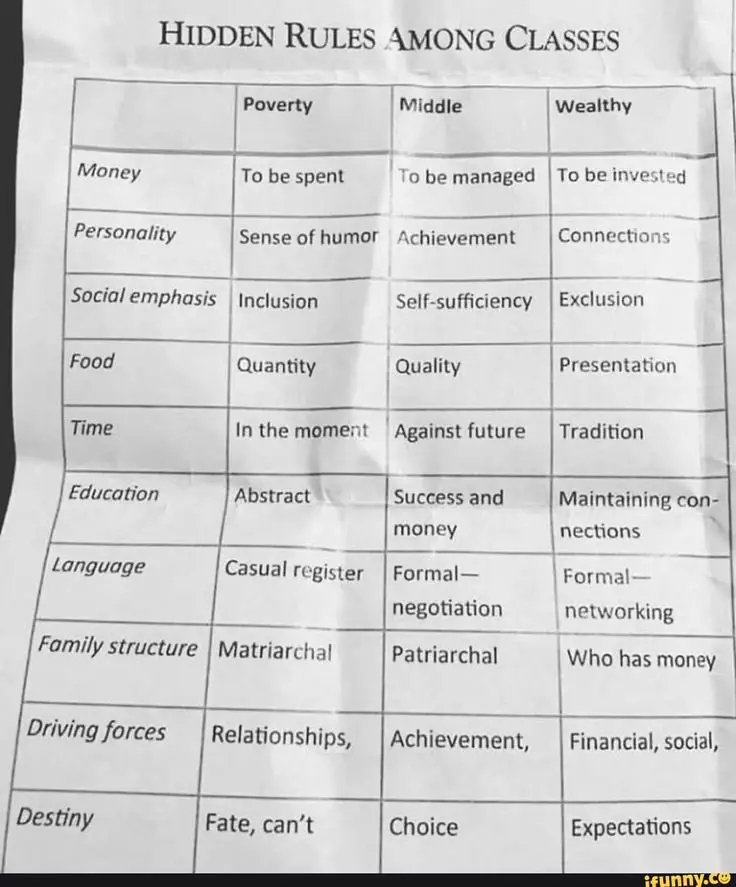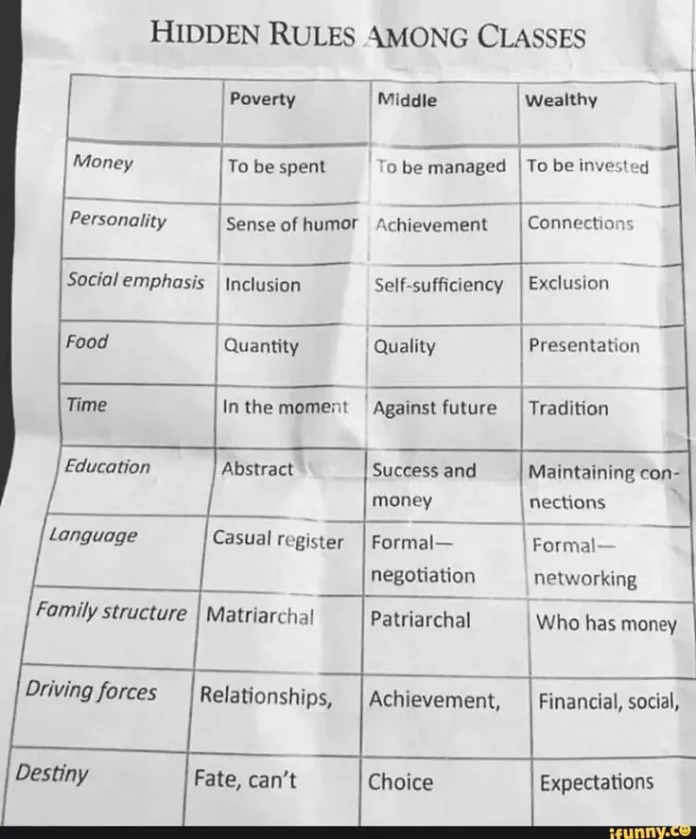
Each social class operates by an invisible playbook—unwritten guidelines that govern all the pieces from how cash is dealt with to what drives private ambition. These hidden frameworks form worldviews, affect day by day choices, and create cultural divides that usually go unrecognized. Understanding these distinctions isn’t about perpetuating stereotypes however illuminating how individuals from completely different financial backgrounds navigate the world.
Cash: Survival, Safety, or Technique
Maybe no distinction is extra basic than how every class conceptualizes cash. For impoverished individuals, cash represents immediacy—it’s meant to be spent as a result of survival calls for it. When sources are scarce, assembly in the present day’s wants takes precedence over tomorrow’s potentialities.
The center class views cash as one thing to be managed and deliberate. Budgets, financial savings accounts, and retirement plans turn into instruments for creating safety towards future uncertainties, fastidiously balancing current wants with future targets.
For the rich, cash transforms right into a wealth-generating software. Funding portfolios and enterprise ventures turn into the main focus. Rich individuals perceive compound curiosity, tax benefits, and preservation methods that multiply generational sources.
What Makes Somebody Useful
Every class values completely different character traits that reveal what every group must thrive. In poverty, humor turns into important social foreign money. The power to chuckle, inform tales, and entertain strengthens group bonds, offering essential assist networks.
The center class prizes achievement above all. Levels, certifications, and promotions outline social standing. Private accomplishments display the self-sufficiency and upward mobility that characterize middle-class values.
Among the many rich, connections reign supreme. Who you realize determines alternatives and social standing. The right introduction can open doorways that no quantity of particular person achievement may unlock. Relationships are cultivated fastidiously and maintained strategically.
Group: Inclusion, Independence, or Exclusion
These in poverty emphasize inclusion as a result of survival usually depends upon group assist. When formal techniques fail, casual networks of mutual assist turn into lifelines. No person will get left behind as a result of tomorrow you would possibly need assistance your self.
Center-class tradition stresses self-sufficiency. The perfect is dealing with one’s personal issues and avoiding being a burden. This stems from the center class’s place between poverty and wealth—safe sufficient to not require fixed group assist however not rich sufficient to rent assist.
The rich observe exclusion via personal golf equipment, gated communities, and unique faculties that protect sources and social capital inside established networks. Shortage of entry replaces shortage of sources.
From Meals to Time: On a regular basis Variations
Even common experiences reveal class distinctions. Meals and amount matter most in poverty—the precedence is having sufficient to go round. The center class focuses on high quality, with natural produce and dietary worth turning into priorities. For the rich, presentation turns into paramount, with meals as artwork, expertise, and social assertion.
Time orientation differs dramatically. These in poverty reside within the current as a result of the long run feels unsure. Planning is complicated when instant crises always demand consideration. The center class lives for the long run—retirement accounts and profession trajectories mirror funding in delayed gratification. The rich view time via custom, with household legacies and multi-generational wealth methods creating connections that transcend particular person lifetimes.
Schooling: Summary, Pathway, or Community
For these in poverty, schooling usually stays summary—disconnected from day by day survival wants. The connection between classroom studying and higher outcomes isn’t at all times seen, significantly when group success tales got here via different means.
Center-class households view schooling as the first pathway to success. Grades and levels instantly correlate with profession alternatives and incomes potential, serving because the car for sustaining or bettering class standing.
Among the many rich, schooling focuses on connections. The best faculties present entry to networks that final a lifetime; who you meet issues greater than what you be taught.
Communication and Management
Linguistic patterns mirror class boundaries. Poverty tradition makes use of informal, direct communication targeted on relationships. The center class employs formal language for skilled development, with code-switching turning into important. Rich communication emphasizes networking subtleties—understanding what to not say and understanding implicit meanings.
Household constructions observe predictable patterns: poverty usually creates matriarchal constructions the place ladies handle sources; middle-class households have a tendency towards conventional or egalitarian fashions; in rich households, whoever controls the cash holds energy.
Individuals’s motivations differ essentially. These in poverty are pushed by relationships—household and group present which means when materials sources are restricted. The center class is motivated by achievement and reaching the following degree. For the rich, preserving wealth and sustaining social place turn into main issues.
Future: Destiny, Alternative, or Expectation
Maybe most essentially, courses differ of their sense of management. In poverty, destiny usually feels figuring out. When techniques appear rigged and efforts don’t reliably produce outcomes, believing “you possibly can’t management what occurs” displays lived expertise.
The center class believes in alternative. Onerous work and good choices decide outcomes. Success is earned; failure is avoidable via correct planning.
The rich function inside expectations. Household legacy and inherited duty create a predetermined path. Future isn’t random destiny or pure alternative however fulfilling the position that wealth creates.
Bridging the Divide
These hidden guidelines aren’t ethical judgments however cultural frameworks formed by financial actuality. Every class develops values suited to its circumstances. The center-class instructor puzzled by a pupil who doesn’t plan, the rich employer confused by an worker’s household obligations, the individual in poverty pissed off by middle-class formality—all these tensions stem from working by completely different unwritten guidelines.
Recognizing these invisible frameworks is step one towards real understanding throughout class strains. Solely by acknowledging these completely different playbooks can we bridge divides and construct empathy in a society the place financial background shapes what now we have and the way we see the world itself.

